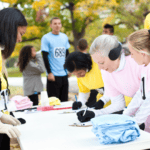It is important to us at Star Legacy Foundation to raise awareness for the 1 in 4 families who will loss a baby to pregnancy and infant loss. We have many ways we raise awareness and also have ideas for ways you can, too. Read about the ways we raise awareness for pregnancy loss, stillbirth and infant death.

If you or someone you care about has lost a child to stillbirth, miscarriage, SIDS, or any other cause at any point during pregnancy or infancy, please join us in raising awareness in October for Pregnancy and Infant Loss Awareness Month.

Our Stillbirth Scorecards take the CDC stillbirth data and organizes it into a one page document you can share to raise awareness about the stillbirth crisis. We have cards for each individual state as well as one for the entire United States.

Star Legacy Foundation is honored to partner with families and organizations across the United States to raise awareness and bring together a community of support. We would love to work you to bring a champion event to your area in memory of your baby.

Our Proclamation Toolkit can help you request a proclamation for Pregnancy and Infant Loss Awareness Month in October. A proclamation is a public or official announcement, especially one dealing with a matter of great importance.
Partnering for Prevention is more than just a campaign at Star Legacy Foundation! It describes our vision and how we approach all of our projects. Contact us or visit our store to receive a complimentary printed copy of our booklet Parenting in Pregnancy.
We believe significant progress can be made to prevent many stillbirths, neonatal deaths, and related losses. To reach our goals, we all need to work together! Families, health professionals, policy makers, researchers, and communities can all play a role in improving the outcomes of thousands of pregnancies. Join us in this effort because all pregnancies deserve a happy ending!
We are happy to bring an awareness presentation to your community organization. Contact us to schedule with our speakers bureau.

Star Legacy Foundation. All Rights Reserved. Privacy Policy Disclaimer
Registered 501(c)(3) EIN: 26-0227601